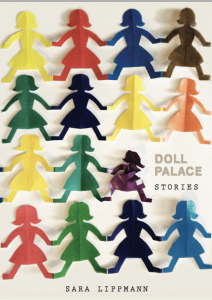 We are pleased to welcome Sara Lippmann to Fictionaut’s Writers on Craft. Sara is the recipient of a 2012 Fellowship in Fiction from the New York Foundation for the Arts. Her work has appeared in Tupelo Quarterly, Joyland, Mr. Beller’s Neighborhood, PANK, The Potomac Review, Fourth Genre, Slice Magazine, and many other print and online publications. Raised outside of Philadelphia, she lives with her husband and children in Brooklyn.
We are pleased to welcome Sara Lippmann to Fictionaut’s Writers on Craft. Sara is the recipient of a 2012 Fellowship in Fiction from the New York Foundation for the Arts. Her work has appeared in Tupelo Quarterly, Joyland, Mr. Beller’s Neighborhood, PANK, The Potomac Review, Fourth Genre, Slice Magazine, and many other print and online publications. Raised outside of Philadelphia, she lives with her husband and children in Brooklyn.
What do you read when you despair at the state of either your work or a particularly difficult manuscript in progress—any “go to” texts?
When I’m feeling down on my work – which is often – I don’t usually drop, stop, and read. I do have lots of papers taped on my wall, smart things smart writers have said, advice from Vonnegut to Keret to Elissa Schappell, but when the despair hits, all the affirmations in the world won’t alleviate it. It’s time to shift things up. Take a walk. Go for a run. Bake. Be utterly radical and shower! Whatever clears the mind. For me, this is not the time to pick up a brilliant novel effortlessly written by a wildly successful author. That would only feed the voices already calling me an idiot, demanding Who do you think you are? This is the time for me to get out of my headspace. I’m my own worst block.
If you could give just one piece of advice to emerging authors about editing that has served you well, what would it be?
Julie Regan, a professor of mine in college, cribbed from Miles Davis and told us to look for/make sure we could answer the question of “So what?” It may sound flip, but I’ve found it indispensable as editing advice. Can your story hold up to the Four Questions of the Seder table: Why this night as opposed to all others? Why this story? This moment? These characters? Meg Wolitzer talks about the imperative, which is another way of putting it. Locate the imperative; chase it down. Stay with that critical pulse. That’s what will lend your work urgency; that’s what’s yours alone; that’s what will make it ring true.
How has your perception of what you “do” with your work changed as you have continued to write?
 When my kids were little, it was hard for me to give myself permission to write. To carve out any time at all. Diapers, potty-training – every waking moment seemed spoken for. What did I think I was doing? But no one is going to give you the time unless you take it. A few minutes a day. And no, it doesn’t happen every day. But even on non-writing days I try to engage the senses, and stay open in case something comes. Justify it all as the space around the actual work. Book or no book, I still can’t call myself a writer without feeling absurd. But the truth is, other than a handful of stints spent teaching, editing, breast-feeding, I have no other skill set. (If only I’d majored in something else!) Although I can sleep. Even on the nights I stay up late working, I’m out the second I shut the light. If I may boast, I’m an expert sleeper.
When my kids were little, it was hard for me to give myself permission to write. To carve out any time at all. Diapers, potty-training – every waking moment seemed spoken for. What did I think I was doing? But no one is going to give you the time unless you take it. A few minutes a day. And no, it doesn’t happen every day. But even on non-writing days I try to engage the senses, and stay open in case something comes. Justify it all as the space around the actual work. Book or no book, I still can’t call myself a writer without feeling absurd. But the truth is, other than a handful of stints spent teaching, editing, breast-feeding, I have no other skill set. (If only I’d majored in something else!) Although I can sleep. Even on the nights I stay up late working, I’m out the second I shut the light. If I may boast, I’m an expert sleeper.
What do you feel is the purpose of literature?
Who said anything about purpose?
If you read something and it resonates and you enjoy it or laugh and are moved to share it with another and maybe feel a little less alone in the world, then that’s something, however fleeting it may be, that’s all I could hope for.
As a human being, what is the best advice you have to offer?
I think George Saunders’ commencement speech on kindness pretty much covers it.
It seems that an awakening sense of self is a feature that many of your short stories exhibit and that you enjoy working with young narrators and or sexual coming of age stories. Has this always been a fascination for you? How do you think your use of sexuality informs your narrative themes?
I was probably in 7th grade, life science, when my teacher divided all living things in the world by their reproductive style: sexual or asexual. Because I was a preteen the classification came with an outburst of classroom laughter. There it was, laid out for us: Sex as a fundamental defining aspect of animal behavior. Each one of us was a sexual being – by nature. We were not jellyfish.
Thank god for that.
So, yes. It’s that straightforward. Sex/sexuality as a driving force of human motivation. Sex not just as procreation but pleasure, power, politics, want/need, consumerism, escapism, selfishness and selflessness, an act of love, an attempt at connection, something to withhold, a desperate grasping in the dark, a hollow transaction, that which can both fulfill and leave us even lonelier.
Like many writers, it pervades my writing. But what I’m drawn to most is the push/pull of desire, the magnetic forces at work, mysteries and rules of attraction and how they are subverted – than the actual play by play. The sex act in and of itself – like eating and shitting – like any basic function, is not that interesting. Everyone does it. What is interesting to me is what sex – like chewing an apple – reveals about character. How a character’s sexual impulse or restraint in a given moment services the story, how it affects the person, brings the narrative to life. A character may get naked in his/her body but still remain cloaked/clothed, and then what – what light does it shed? Where is the fall-out? How does it brush against cultural norms and societal expectations?
My “sexiest” stories are less about sex and more about the tension and ache around it, the energy between people. What transpires in a gesture. The physical exchange often takes place in the margins, off page, if at all. Although I won’t shy away from writing a sex act when I think it is warranted, I have little patience for coyness, for the stilted artificiality of the veil as erotic code, the candle-lit packages fed to us in movies, dripping with sincerity, all the overreaching and overwriting. Sex is not precious nor should it be treated as such. Even if the characters themselves are being dishonest in the moment, it’s the writer’s job to keep the action honest. You can usually tell when sex scenes have been tacked on and have not risen from a novel organically – when they are there to provoke or to sate the marketplace and not because the narrative demands it – because you feel all sorts of ick reading them. The bad kind of dirty.
And that’s a rant.
So many of the stories in Doll Palace have what I would call the “quiet disintegrations” at their hearts and a strong sense of place. How do you think setting works to connect to readers to a narrative?
Heather, I love that phrase “quiet disintegration.” The characters may be falling apart inside, but you are right, they aren’t being loud and dramatic about it. They are trying to hold it together even as their façades are crumbling. A lot of the settings reflect that sense of decay: Atlantic City in winter, a Jewish tchotchke shop on the outskirts of town, a decrepit prewar apartment building.
What’s recently released or in the pipeline for your readers? And what are you working on now? Give us a sneak peek.
I’m working on a novel set in Sullivan County, NY. It takes place over the course of a summer. Lots of pent up sexual energy. I have a ways to go and it feels overwhelming. Denial runs deep. So I’m doing this interview. Tying up a few freelance pieces and reviews. And I’m making soup. Last week’s was butternut squash. I’m currently boiling a chicken in a pot – like a nice Jewish girl.
_________________________________
Writers on Craft is hosted by Heather Fowler, who cares about writing. She does a lot of it. Visit her profile on Fictionaut or see here for more: www.heatherfowlerwrites.com.
Oct 21st, 2014 at 10:01 pm
Oh how lovely to come to the wonderful Sara Lippmann today. I especially like her candor on the idea of purpose and the inspiration of sex. And her mention of Saunders on kindness.
Beautiful writer and person. Thanks for sharing this!
Oct 22nd, 2014 at 10:41 am
Splendid interview.
Oct 22nd, 2014 at 4:21 pm
What a sweet surprise to see Sara interviewed by Heather- two of my favorite writers in the huge Universe of creative people we live among. This is so honest, and off-the-cuff. Just like talking with Sara is, and it made me miss her all the more. Fantastic!